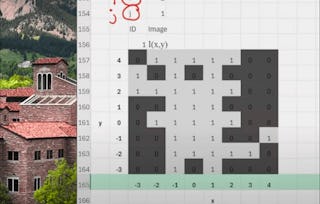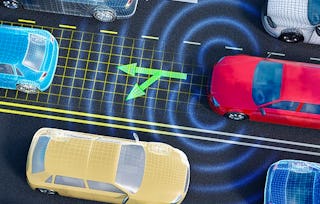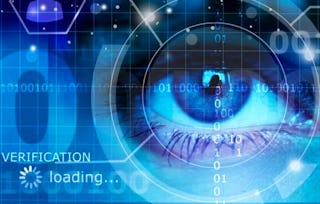By the end of this course, learners will understand what computer vision is, as well as its mission of making computers see and interpret the world as humans do, by learning core concepts of the field and receiving an introduction to human vision capabilities. They are equipped to identify some key application areas of computer vision and understand the digital imaging process. The course covers crucial elements that enable computer vision: digital signal processing, neuroscience and artificial intelligence. Topics include color, light and image formation; early, mid- and high-level vision; and mathematics essential for computer vision. Learners will be able to apply mathematical techniques to complete computer vision tasks.


Computer Vision Basics

1,819 reviews
Recommended experience
What you'll learn
Understand what computer vision is and its goals
Identify some of the key application areas of computer vision
Understand the digital imaging process
Apply mathematical techniques to complete computer vision tasks
Skills you'll gain
Details to know

Add to your LinkedIn profile
9 assignments
See how employees at top companies are mastering in-demand skills

There are 4 modules in this course
In this module, we will discuss what computer vision is, the fields related to it, the history and key milestones of it, and some of its applications.
What's included
13 videos2 readings3 assignments1 app item1 plugin
In this module, we will discuss color, light sources, pinhole and digital cameras, and image formation.
What's included
4 videos1 reading3 assignments2 app items
In this module, we will discuss the three-level paradigm of computer vision that was proposed by David Marr. We will also discuss low, mid, and high level vision.
What's included
5 videos1 reading2 assignments1 app item
In this lecture, we will discuss the Mathematics used in Computer Vision, which includes linear algebra, calculus, probability, and much more.
What's included
8 videos2 readings1 assignment1 app item
Instructors

Explore more from Algorithms
 Status: Free Trial
Status: Free TrialMathWorks
 Status: Free Trial
Status: Free TrialUniversity of Colorado Boulder
 Status: Free Trial
Status: Free TrialMathWorks
Why people choose Coursera for their career

Felipe M.

Jennifer J.

Larry W.

Chaitanya A.
Learner reviews
- 5 stars
55.90%
- 4 stars
23.74%
- 3 stars
10.50%
- 2 stars
4.17%
- 1 star
5.66%
Showing 3 of 1819
Reviewed on Jun 16, 2019
I would like to thank my course instructor. It is a short introductory course.It's interesting and have pushed me to further complete other courses in the specialization.
Reviewed on May 14, 2020
Nice Course. I'm very hard to study and practice to passed the assignment. And that could give the experience on matlab including Image Processing skills. Thank a lot!
Reviewed on Jul 30, 2019
Overall great, howeve the last assignment needed more help/background from the instructors than provided. I pass 96% of the class but still was not able to get the certificate.

Open new doors with Coursera Plus
Unlimited access to 10,000+ world-class courses, hands-on projects, and job-ready certificate programs - all included in your subscription
Advance your career with an online degree
Earn a degree from world-class universities - 100% online
Join over 3,400 global companies that choose Coursera for Business
Upskill your employees to excel in the digital economy
Frequently asked questions
Learners should have basic programming skills and experience (understanding of for loops, if/else statements). Learners should also be familiar with the following: basic linear algebra (matrix vector operations and notation), 3D co-ordinate systems and transformations, basic calculus (derivatives and integration), basic probability (random variables), and 3D co-ordinate systems & transformations.
To access the course materials, assignments and to earn a Certificate, you will need to purchase the Certificate experience when you enroll in a course. You can try a Free Trial instead, or apply for Financial Aid. The course may offer 'Full Course, No Certificate' instead. This option lets you see all course materials, submit required assessments, and get a final grade. This also means that you will not be able to purchase a Certificate experience.
When you purchase a Certificate you get access to all course materials, including graded assignments. Upon completing the course, your electronic Certificate will be added to your Accomplishments page - from there, you can print your Certificate or add it to your LinkedIn profile.
More questions
Financial aid available,





